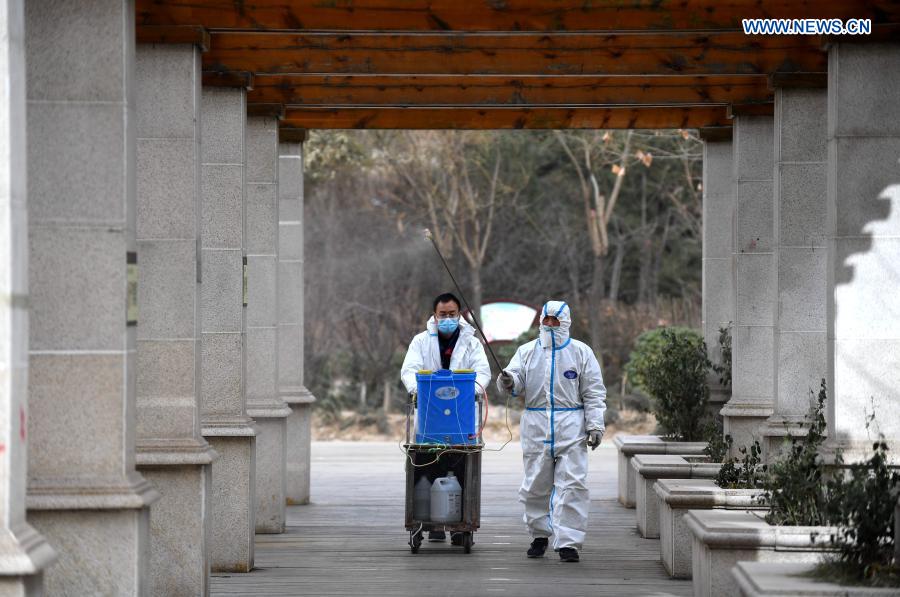


Staff members spray disinfectant at a community which was classified as a medium-risk area for COVID-19, in Yuhua district of Shijiazhuang, North China's Hebei province, Jan 12, 2021. (Photo/Xinhua)
Strict implementation of containment measures will stop COVID, expert says
It is highly unlikely that China will experience a major resurgence of the novel coronavirus during the upcoming Spring Festival, given that the nation has created containment measures to quickly identify, isolate and control any possible outbreaks, a health official said on Wednesday.
Feng Zijian, deputy director of the Chinese Center for Disease Control and Prevention, said the center has gained more understanding of the novel coronavirus in the fight against the epidemic during more than a year.
Large population movements and concentrations during Spring Festival, the top traditional time for family reunions, and the increasing number of parcels being delivered, especially imported cold-chain goods, will add to the risks of COVID-19 infection.
However, as long as epidemic containment measures are strictly implemented, there will not be a large resurgence of the COVID-19 epidemic, he said at a news conference held by the Joint Prevention and Control Mechanism of the State Council.
Wang Bin, an official at the National Health Commission's disease prevention and control bureau, said: "We advise people not to travel during the Spring Festival holidays unless absolutely necessary."
The country is likely to face a "major test" in containing the epidemic during this year's Spring Festival travel rush, which begins on Jan 28 and ends on March 8, she said.
Every sector of society, including local governments, high-risk areas such as airports and ports as well as individuals, should strictly enforce epidemic control measures to deal with the increased risks, she said.
Hebei province reported 90 new confirmed COVID-19 cases and 15 asymptomatic carriers on Tuesday, the provincial health commission said on Wednesday. It was the highest daily increase in confirmed cases in the province since the cluster infection broke out on Jan 2.
Among them were people who had been at gatherings such as weddings and children, including a 6-month-old baby.
After reporting new cases for 11 consecutive days since Jan 2, Hebei had a total of 395 recently confirmed COVID-19 patients and 215 asymptomatic carriers as of the end of the day on Tuesday, according to the provincial health commission. Most of the cases are in Shijiazhuang, the provincial capital.
Feng said the recent outbreak in Shijiazhuang will be contained in no time as long as the containment measures are promptly and decisively implemented.
The city has limited the movement of people and conducted nucleic acid tests on all residents to curb the spread of the disease. While a certain amount of new cases are reported every day, they are all from people under observation, he said.
Other regions have increased the tracing of people who have arrived from the city since Dec 15, helping curb the further spread of the outbreak, Feng said.
Elsewhere, Heilongjiang province reported 16 new local cases and Shanxi reported one on Tuesday, the National Health Commission said on Wednesday.
Heilongjiang declared a state of emergency on Tuesday and as of Wednesday afternoon, the province had reported 57 confirmed cases since Sunday.
Wang said that despite the recent outbreaks in different parts of the country, the overall epidemic situation in China is under control.
The country has been facing great pressure in containing the pandemic as respiratory viruses such as the novel coronavirus are likely to circulate faster during the winter and the wide spread of the virus overseas also has created unprecedented pressure to prevent imported transmissions, she said.
Wang said the commission has teamed up with authorities in foreign affairs, transport and customs agencies to implement predeparture disease control measures targeting incoming passengers.
The new policy requires overseas travelers to present certificates of both negative nucleic acid test results and negative IgM antibody test results before boarding.
"Meanwhile, we have intensified testing and disinfection of cold-chain imports and transportation vehicles involved in shipping them," she said. "Cold-chain workers are also required to take regular nucleic acid tests."
In response to the rising number of domestic infections, Wang said a vital step is to conduct regular tests on people considered at higher risk of contracting the virus, in order to identify new infections as soon as possible.

 Award-winning photos show poverty reduction achievements in NE China's Jilin province
Award-winning photos show poverty reduction achievements in NE China's Jilin province People dance to greet advent of New Year in Ameiqituo Town, Guizhou
People dance to greet advent of New Year in Ameiqituo Town, Guizhou Fire brigade in Shanghai holds group wedding
Fire brigade in Shanghai holds group wedding Tourists enjoy ice sculptures in Datan Town, north China
Tourists enjoy ice sculptures in Datan Town, north China Sunset scenery of Dayan Pagoda in Xi'an
Sunset scenery of Dayan Pagoda in Xi'an Tourists have fun at scenic spot in Nanlong Town, NW China
Tourists have fun at scenic spot in Nanlong Town, NW China Harbin attracts tourists by making best use of ice in winter
Harbin attracts tourists by making best use of ice in winter In pics: FIS Alpine Ski Women's World Cup Slalom
In pics: FIS Alpine Ski Women's World Cup Slalom Black-necked cranes rest at reservoir in Lhunzhub County, Lhasa
Black-necked cranes rest at reservoir in Lhunzhub County, Lhasa China's FAST telescope will be available to foreign scientists in April
China's FAST telescope will be available to foreign scientists in April